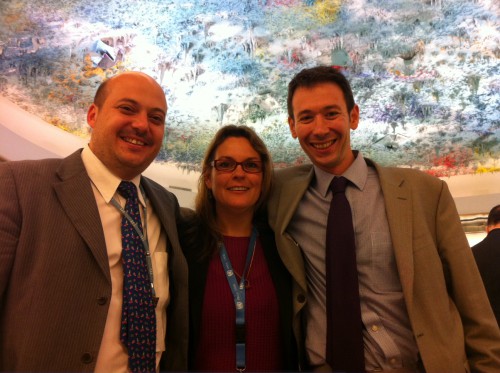1st October 2014 Geneva, Switzerland
Back to the future
I don’t get much time to read any books of my own these days. With two young children, most of the literature that comes my way tends either to have sparkly shapes, no more than about 10 words a page or contain clearly accessible lessons in morality. Which makes them the exact opposite of Human Rights Council resolutions. Reading with my kids at bedtime is my favourite part of the day, and not just because it’s an excuse for a quick nap while my wife isn’t watching. I’ve always enjoyed stories that end on a happy note, where good prevails over bad, often against the odds. I like it when it happens in real life too.
This Council session, which started on the back of a crisis-filled summer, has turned out to be unexpectedly historic. When it began most of us were not sure if Uruguay, Chile, Colombia and Brazil would go ahead with a resolution on sexual orientation and gender identity. When they announced on day 1 that they would do so, it was welcomed as a courageous move by the human rights community, and one which felt long overdue. Discussion on this issue has stalled since the first Council resolution led by South Africa in 2011. When that resolution passed it felt like the breakthrough that would turn the tide on international protection for the rights of lesbian, gay, bisexual and transgender people. But progress on human rights is never linear and in the absence of South African leadership since then, no state had been willing to take up the baton. Until now.
It is to the enourmous credit of the four countries concerned that they were willing to champion this issue and especially fitting that Brazil was among the group of lead countries. Back in 2003, when the Council was still a mere twinkle in the eye of the previous Secretary General, when my hair was all pepper and no salt, and when Manchester United knew how to win games, Brazil brought forward a surprise resolution on human rights and sexual orientation at the old Commission on Human Rights. The resolution had looked set to be a game-changer, but on the day it was due to be voted a confrontation ensued and UN security were called in to keep irate OIC Ambassadors away from the Libyan Chairperson and former High Commissioner Sergio Vieira de Mello. The resolution was eventually blocked by procedural delays and the issue then lay dormant for 8 years until South Africa stepped forward.
The overall vote count on Friday, with 25 Council members in favour and only 14 against marks a major positive shift from 2011, when the resolution passed by just 4 votes. After seeing progress on this issue start and stall twice, it is now time to look to the future. We need a sustained international debate, focused on protecting individual rights, if the next generation of LGB &T people are to grow up free from discrimination and violence.
It was encouraging to see South Africa maintain its previous positive stance by voting in favour and to see Sierra Leone, Burkina Faso, Namibia, Congo, India, China and Kazakhstan all abstain. Real credit goes to Vietnam, who voted in favour, reflecting its progressive stance domestically, and to the Philippines who made an important statement against discrimination and violence on the grounds of sexual orientation and gender identity before voting yes. Egypt’s seven successive amendments aimed at sinking the resolution failed and it makes you wonder how many friends they win from such an obstructive approach.
One of the down sides of the diplomatic world is having to say goodbye to great colleagues on a regular basis. Like in any job, personalities are what make the difference and there are some big ones who will be leaving the Council after this session. So farewell kisses, hugs and handshakes (I will let each of you decide which one you want) to Salvador, Peter, Gerold, Yaprak, Johannes, Stephen and Junichiro and the others I’ve forgotten. We haven’t always agreed on everything, but you’ve been great colleagues and made a huge contribution. And a special word of thanks to Julie from Human Rights Watch, whose energy and moral drive have steered the Council towards most of its major achievements in recent years. As someone so committed to the LGBTI cause, it was a fitting session for her to bow out. After all, everyone loves a happy ending.

Excellent blog Bob!
Great blog Bob. I had a tear in my eye as I read this! Melanie